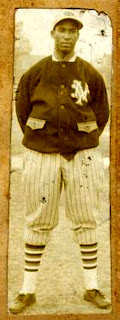Emory Libraries will hold a symposium on the history of African Americans in sports and their effect on civil rights.
“What’s Next? A Symposium on Race and Sports in American Culture” will be held Wed., May 11, 2011 from 4 to 6 p.m. in the Jones Room of Woodruff Library, 540 Asbury Circle on the Emory University campus. The event is free and open to the public.
Symposium participants will examine the effect of African American athletes such as Jackie Robinson, Hank Aaron and many others on American culture; analyze the impact of race and sports on civil rights history; and spark discussion about what’s next beyond the traditional recognition of breaking racial barriers in sports.
“This conversation is important because society, particularly young people, often idolize current athletes and the notoriety they achieve, the large salaries they make,” says Randall K. Burkett, curator of African American Collections at Emory’s Manuscript, Archives, and Rare Book Library (MARBL) and one of the symposium’s organizers. “We need to focus on the early African American athletes and struggles they faced – the ones who paved the way and made it possible for modern athletes to enjoy the successes they do.”
Dr. Lewis is author and co-editor of seven books, among them In Their Own Interests: Race, Class and Power in 20th Century Norfolk (1993) and the award-winning To Make Our World Anew: A History of African Americans (2000).
Light refreshments and conversation will follow the panel. The symposium is sponsored by the Graduate Institute of the Liberal Arts, Department of African American Studies, and Emory Libraries.
Parking is available in the Fishburne deck; visit arts.emory.edu/village/map for directions.
The Emory University Libraries (web.library.emory.edu/) in Atlanta and Oxford, Ga., are an intellectual commons for Emory University, Atlanta and the world. The nine libraries’ holdings include more than 3.4 million print and electronic volumes, 56,000-plus electronic journals, and internationally renowned special collections.
Emory University (www.emory.edu) is known for its demanding academics, outstanding undergraduate experience, highly ranked professional schools and state-of-the-art research facilities. Perennially ranked as one of the country’s top 20 national universities by U.S. News & World Report, Emory encompasses nine academic divisions as well as the Carlos Museum, The Carter Center, the Yerkes National Primate Research Center and Emory Healthcare, Georgia’s largest and most comprehensive health care system.
For more information: Maureen McGavin: 404.727.6898, mmcgavi@emory.edu or Elaine Justice: 404.727.0643, elaine.justice@emory.edu.
















No comments:
Post a Comment